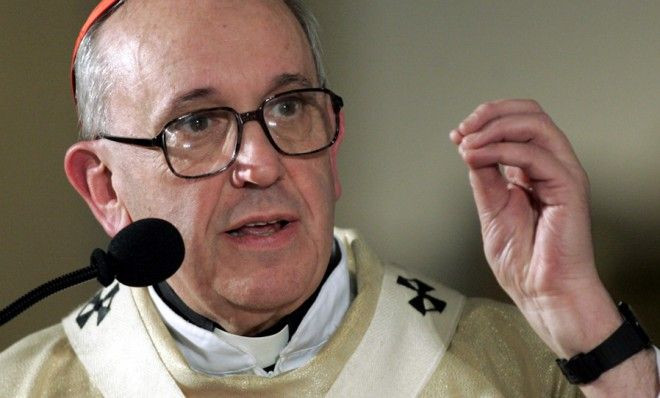Pope Francis Already In Hot Holy Water: Was Bishop Bergoglio A Darling Of Argentine Dictators?

For the first time, a South American has been chosen to lead the Catholic Church. Though he will now be known as Pope Francis, his given name Jorge Mario Bergoglio -- and all the history that goes with it -- will be attached to the new pontiff for as long as he retains the Throne of St. Peter.
Ever since his surprise ascension, followers, analysts and pundits all over the globe are digging into that history to learn more about the leader of the world’s largest religious community. Pope Francis has plenty of fans -- but he also has some virulent enemies.
Some of the most stinging criticisms of Bergoglio come not from the Vatican, but from his own home country of Argentina. Leading the critics is Horacio Verbitsky, an author and investigative journalist who has spent his career digging through the darkest days of Argentina’s history.
For seven years, Argentina was ruled by a military junta that seized power in a 1976 coup led by Gen. Jorge Rafael Videla, who held the presidency until 1981. After his reign, a string of military members took over until the dictatorship finally fell apart in 1983 after a foolhardy invasion of the Falkland Islands.
While the junta held power, leftist political dissidents were targeted by pro-regime forces in a fierce guerrilla-style conflict -- but much of the battle took place clandestinely. The regime "disappeared" thousands of people during what is now referred to as Argentina’s Dirty War; military leaders also condoned kidnapping babies that were born to political prisoners and givng them to their supporters.
Videla has since been sentenced to life in prison. So have some of his fellow despots, including the last dictator, Reynaldo Benito Bignone, who was already in prison but was just sentenced to another life term just this week for human rights violations.
The Catholic’s Church’s level of complicity in this carnage is highly disputed, but Verbitsky and others argue that Bergoglio was among those whose silence -- and even cooperation -- allowed terrible acts to occur.
In a Thursday column for Pagina/12, a Buenos Aires newspaper, Verbitsky accused Bergoglio of denying knowledge about kidnappings and disappearances while he worked as a Jesuit cleric during the late 1970s and early 1980s, and of hiding certain documents in order to protect bishops who cooperated with Videla.
“Bergoglio said that his episcopal archives did not contain documents about the detained and disappeared,” wrote Verbtisky.
“But the man who succeeded him, Jose Arancedo [the current president of the Argentine Episcopal Conference], did send documents to Judge Martina Forns … regarding meetings between the dictator Videla and the bishops Raul Primatesta, Juan Aramburu and Vicente Zazpe, in which they spoke with extraordinary frankness about whether or not to say that the disappeared had been assassinated, because Videla wanted to protect those who killed them.”
The argument against Bergoglio is a hard one to substantiate. Decades have passed, evidence has been lost or destroyed, and people involved have died. Furthermore, complacency -- Verbtisky’s main argument against Bergoglio -- is a tricky concept. In those dark days, who’s to know what really transpired? Could Bergoglio’s silence be morally excused if he actually feared for his life? Or might he have taken secret actions to save victims of the junta?
One Argentine thinker and activist, Nobel Peace Prize winner Adolfo Perez Esquivel, told the BBC on Thursday that Bergoglio was innocent.
“There were bishops who were accomplices of the dictatorship, but it was not the case of Bergoglio,” he said.
“Bergoglio was questioned because it is said he did not do enough to get out of jail two priests [who were tortured but not killed in detention], as he was the superior of the Jesuits. But I know personally that many bishops called on the military junta for the release of prisoners and priests and these requests were not granted.”
Last year -- almost three decades after Dirty War ended -- Argentine bishops put out a statement of apology, admitting that the church had not done enough to stop the junta from violating human rights.
“We share everyone’s pain and once again ask the forgiveness of everyone we failed or didn’t support as we should have,” it said. But Bergoglio and his fellow bishops have always denied complicity in the junta’s brutal campaign of violence.
The debate is sure to continue as more investigations into Bergoglio’s record proceed -- Verbitsky, for one, is adamant that Pope Francis is unfit to lead the church through troubled times.
“What I know for sure is that the new bishop of Rome will be an ‘ersatz,’ the German word that no translation does justice: a poorer quality substitute, like the water mixed with flour that indigent mothers use to cheat their children’s hunger,” Verbitsky said.
© Copyright IBTimes 2024. All rights reserved.






















